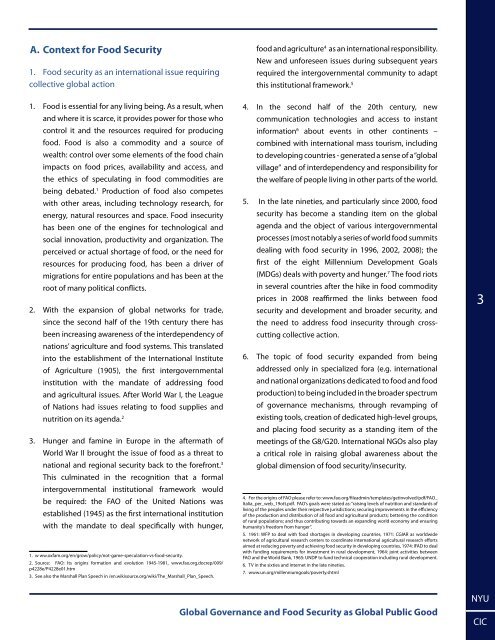Global Governance and Food Security as Global Public Good
Global Governance and Food Security as Global Public Good
Global Governance and Food Security as Global Public Good
You also want an ePaper? Increase the reach of your titles
YUMPU automatically turns print PDFs into web optimized ePapers that Google loves.
A. Context for <strong>Food</strong> <strong>Security</strong>1. <strong>Food</strong> security <strong>as</strong> an international issue requiringcollective global action1. <strong>Food</strong> is essential for any living being. As a result, when<strong>and</strong> where it is scarce, it provides power for those whocontrol it <strong>and</strong> the resources required for producingfood. <strong>Food</strong> is also a commodity <strong>and</strong> a source ofwealth: control over some elements of the food chainimpacts on food prices, availability <strong>and</strong> access, <strong>and</strong>the ethics of speculating in food commodities arebeing debated. 1 Production of food also competeswith other are<strong>as</strong>, including technology research, forenergy, natural resources <strong>and</strong> space. <strong>Food</strong> insecurityh<strong>as</strong> been one of the engines for technological <strong>and</strong>social innovation, productivity <strong>and</strong> organization. Theperceived or actual shortage of food, or the need forresources for producing food, h<strong>as</strong> been a driver ofmigrations for entire populations <strong>and</strong> h<strong>as</strong> been at theroot of many political conflicts.2. With the expansion of global networks for trade,since the second half of the 19th century there h<strong>as</strong>been incre<strong>as</strong>ing awareness of the interdependency ofnations’ agriculture <strong>and</strong> food systems. This translatedinto the establishment of the International Instituteof Agriculture (1905), the first intergovernmentalinstitution with the m<strong>and</strong>ate of addressing food<strong>and</strong> agricultural issues. After World War I, the Leagueof Nations had issues relating to food supplies <strong>and</strong>nutrition on its agenda. 23. Hunger <strong>and</strong> famine in Europe in the aftermath ofWorld War II brought the issue of food <strong>as</strong> a threat tonational <strong>and</strong> regional security back to the forefront. 3This culminated in the recognition that a formalintergovernmental institutional framework wouldbe required: the FAO of the United Nations w<strong>as</strong>established (1945) <strong>as</strong> the first international institutionwith the m<strong>and</strong>ate to deal specifically with hunger,1. w ww.oxfam.org/en/grow/policy/not-game-speculation-vs-food-security.2. Source: FAO: Its origins formation <strong>and</strong> evolution 1945-1981, www.fao.org.docrep/009/p4228e/P4228e01.htm3. See also the Marshall Plan Speech in /en.wikisource.org/wiki/The_Marshall_Plan_Speech.food <strong>and</strong> agriculture 4 <strong>as</strong> an international responsibility.New <strong>and</strong> unforeseen issues during subsequent yearsrequired the intergovernmental community to adaptthis institutional framework. 54. In the second half of the 20th century, newcommunication technologies <strong>and</strong> access to instantinformation 6 about events in other continents –combined with international m<strong>as</strong>s tourism, includingto developing countries - generated a sense of a “globalvillage” <strong>and</strong> of interdependency <strong>and</strong> responsibility forthe welfare of people living in other parts of the world.5. In the late nineties, <strong>and</strong> particularly since 2000, foodsecurity h<strong>as</strong> become a st<strong>and</strong>ing item on the globalagenda <strong>and</strong> the object of various intergovernmentalprocesses (most notably a series of world food summitsdealing with food security in 1996, 2002, 2008); thefirst of the eight Millennium Development Goals(MDGs) deals with poverty <strong>and</strong> hunger. 7 The food riotsin several countries after the hike in food commodityprices in 2008 reaffirmed the links between foodsecurity <strong>and</strong> development <strong>and</strong> broader security, <strong>and</strong>the need to address food insecurity through crosscuttingcollective action.6. The topic of food security exp<strong>and</strong>ed from beingaddressed only in specialized fora (e.g. international<strong>and</strong> national organizations dedicated to food <strong>and</strong> foodproduction) to being included in the broader spectrumof governance mechanisms, through revamping ofexisting tools, creation of dedicated high-level groups,<strong>and</strong> placing food security <strong>as</strong> a st<strong>and</strong>ing item of themeetings of the G8/G20. International NGOs also playa critical role in raising global awareness about theglobal dimension of food security/insecurity.4. For the origins of FAO ple<strong>as</strong>e refer to: www.fao.org/fileadmin/templates/getinvolved/pdf/FAO_Italia_per_web_19ott.pdf. FAO’s goals were stated <strong>as</strong>: “raising levels of nutrition <strong>and</strong> st<strong>and</strong>ards ofliving of the peoples under their respective jurisdictions; securing improvements in the efficiencyof the production <strong>and</strong> distribution of all food <strong>and</strong> agricultural products; bettering the conditionof rural populations; <strong>and</strong> thus contributing towards an exp<strong>and</strong>ing world economy <strong>and</strong> ensuringhumanity’s freedom from hunger”.5. 1961: WFP to deal with food shortages in developing countries, 1971: CGIAR <strong>as</strong> worldwidenetwork of agricultural research centers to coordinate international agricultural research effortsaimed at reducing poverty <strong>and</strong> achieving food security in developing countries, 1974: IFAD to dealwith funding requirements for investment in rural development, 1964: joint activities betweenFAO <strong>and</strong> the World Bank, 1965: UNDP to fund technical cooperation including rural development.6. TV in the sixties <strong>and</strong> internet in the late nineties.7. www.un.org/millenniumgoals/poverty.shtml3<strong>Global</strong> <strong>Governance</strong> <strong>and</strong> <strong>Food</strong> <strong>Security</strong> <strong>as</strong> <strong>Global</strong> <strong>Public</strong> <strong>Good</strong>NYUCIC
















